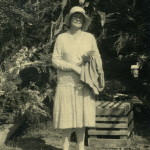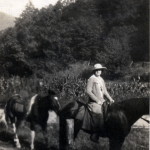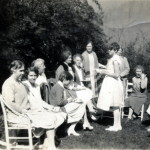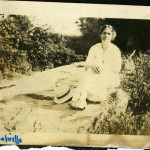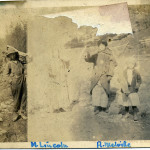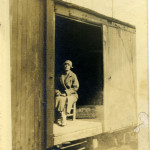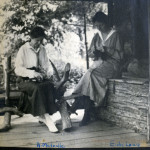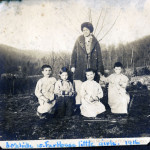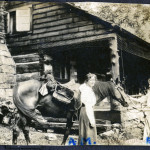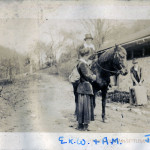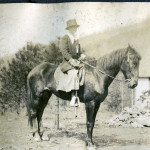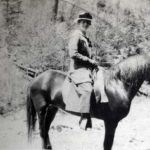Pine Mountain Settlement School
Series 09: BIOGRAPHY – Staff
Angela Melville
Office Organizer, Fundraiser 1916-1920
Associate Director 1928-1930
Mary Angela Melville (1886-1977)
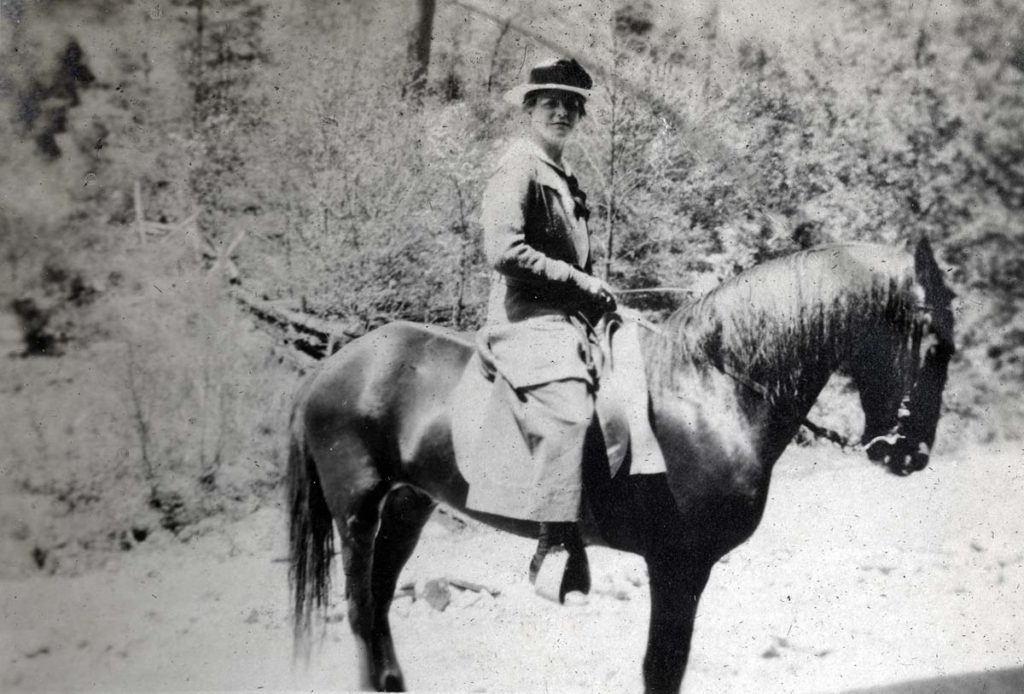
Angela Melville Album II. [melv_II_album_200]
TAGS: Angela Melville, Mary Angela Melville, interim directors, Cooperative Bureau for Women Teachers, National Credit Union Extension Bureau, CUNAverse, credit unions, Brasstown Savings & Loan Association, Line Fork Settlement, fundraising, Darwin D. Martin, PMSS Board of Trustees, Southern Mountain Workers, Sally Loomis, Dr. Alfreda Withington, Jamaica, poems, poetry, balladry
ANGELA MELVILLE Interim Director 1928-1930
PINE MOUNTAIN ASSOCIATE DIRECTOR APPOINTMENT
On July 20, 1928, following the death of Ethel de Long Zande on March 13, 1928, a printed notice from the Pine Mountain Settlement School announced that the School’s Board of Trustees had, on April 29 of that year, “invited Miss Mary Angela Melville to become Associate Director of Pine Mountain Settlement School, and that on August 1st, Miss Melville comes to assume sole charge of the academic department and of the office and fiscal promotion of the school, all of which had the devoted care of the late Mrs. Ethel de Long Zande.” In her new position, Miss Melville was equal in authority to the director, Katherine Pettit (1913 – 1930), but with the specific areas of responsibility listed in the announcement. [See Correspondence with Burton Rogers, 1971]
Article IV of the By-Laws had delegated to an Executive Committee of three members (designated in the 1927 Board minutes) the authority to “possess and exercise all the powers of said Board…” [see Martin letter to E. Wells, March 19, 1928] for the appointment of an associate director. When they selected Angela Melville, Darwin D. Martin, a member of the Executive Committee of the Board of Trustees, sent a letter to Miss Melville, asking if she would assume the position of an associate director with Katherine Pettit. She responded as follows:
New York, N.Y.
April 23, 1928
My dear Mr. Martin:
I found the enclosed letter from Miss [Edith] Canterbury upon my return home this evening. I have returned to the office to send you this letter, as it will be a relief to have the matter off my mind. I enclose the letter from Edith Canterbury, though I take it, from what she says, that you at last got her over the wire. I am sorry she feels as she does.
Regarding Marguerite Butler: I wonder if it has occurred to you that you might wire Mrs. Campbell asking her if she would feel free to release Miss Butler if the latter were interested and if the Pine Mountain vacancy were offered to her? Please do not think me unduly interfering, or too urgent in this matter. I do want you to have the right person if you can get her, and the permanent one. As you know, I am good for two years only, and there is small chance that my character will so change in those two years that I will have become a stable person — it is really not at all likely to happen. Should you want me to take advantage of this suggestion, Mrs. John C. Campbell, Brasstown, N.C., is the address. I hope you may. I happen to know that Mrs. Campbell’s niece is abroad this winter studying the Folk Schools — perhaps she could take Marguerite’s place there?
Then if no one else better is available and it has to be me, this is the way I would prefer to have you present it to Miss Pettit:
1st — That she take me as her co-worker, with equal authority.
2nd — That she want me as Director, preferring herself to keep charge only of her own departments, as you suggested.
I realize that in making the above suggestion I am going counter to what Mrs. Zande wished, as you told me. I realize also that I am complicating my own problems. In spite of this I would prefer it. As nearly as I can get at the truth of my reasons for preferring that I take on the double-headship (which has been so painful these past years), I find: That I cannot free my mind from the blow it will be to Miss Pettit to have me (to her, a whippersnapper) placed in a position nominally above her in the School, and that I feel I owe it to her many years in the mountains to spare her this, if possible. [insert “Read at meeting Apr, 28.”] Also, the cynical side of me knows she will interfere just the same whatever her title, then why add bitterness to her opposition if possible to avoid it?
I think, too, that had Mrs. Zande dreamed I might be the person, she would have felt differently, for she would have realized that it would be awfully hard for me to take a position at Pine Mountain seemingly of more authority than Miss Pettit had. I am willing at least to trust that if Mrs. Zande is conscious of conditions she will understand and approve.
If Miss Pettit declines either of the suggestions named above, then, as you know, I am not a candidate.
I want you to know what a comfort it is, if we are to work together, to have you know me as I am. I should hate it if you thought me strong and powerful! I am so dreadfully weak that you can see anyone can sway me to their needs! But if I am the best you can get now, I am no longer rebellious about it, and promise you that should I have to take on this load, you will hear no more whining from me.
If Miss Pettit tries me as co-worker and it does not work then at the end of the two years the Board will have an easier task, and the person coming in then will have a clear and justified field. At present, what Mrs. Zande has stood for ten years, I should certainly be able to stand for two — to prove the case. Perhaps there will be no need of proof, and we must trust so.
Love for Uncle William who means Pine Mountain to me, and love for Miss Pettit, constrain me [in] this matter.
Very gratefully yours, Angela Melville
When Miss Melville accepted the Board’s invitation to act as associate director of the School, she left the directorship she held for three years at the Cooperative Bureau for Women Teachers in New York. Before that, she worked for two years with the Credit Union National Extension Bureau (CUNEB), organizing both industrial and rural credit unions in many states throughout the United States. In addition to Miss Melville’s position as associate director of PMSS, she had an earlier connection with the School. From 1916 to 1920, she organized the office and as a speaker for the School, raised funds for the School’s endowment, Line Fork Settlement, and general expenses. Paragraphs in the March and November 1920 issues of Notes from the Pine Mountain Settlement School gave these accounts of Miss Melville’s activities during this time:
Miss Angela Melville, who was one of our office force…is spending January and February in making a speaking trip for the School, in the vicinity of New York and Boston. The interest aroused and the funds raised by her work during these two months will help in our running expenses.
Miss Angela Melville spent six months of this year raising a fund with which to carry on the extension work to which Pine Mountain has long looked forward.
Angela Melville: EARLY WORK WITH CREDIT UNIONS
A biography of Miss Melville, posted on CUNAverse, an online site that covers issues affecting credit unions and credit union history, describes her CUNEB activities:
[As a] field representative for the National Credit Union Extension Bureau (CUNEB), [Miss Melville] organized credit unions, primarily in the South (Kentucky and Tennessee), particularly among women’s groups, the poor, miners, postal workers, and railroad workers. She helped organize several leagues and chapters. Her service with the credit union movement was short-lived, but she nevertheless achieved much for CUNEB, including writing the first guide to credit union practice, Some Hints as to Usual Credit Union Practice, which ran through many editions and was the only publicity item for the movement for years.
The May 1924 issue of Notes from the Pine Mountain Settlement School reported that Miss Melville returned to the Kentucky mountains as an organizer for the National Credit Union Extension Bureau, describing her as
… a fit choice for the work of establishing credit unions in rural communities, where mutual confidence needs to be built up and where both the small farmer and the neighborhood need this particularly wholesome form of help.
Miss Melville had also worked a short time with the Brasstown Savings and Loan Association in North Carolina, as described by Marguerite Butler in her article, “The Brasstown Savings and Loan Association,” in the July 1926 issue of Mountain Life & Work:
She believed in the credit union, and having lived as a member of our community for several months, believed in the success of one here. Not only were every one of us filled with her enthusiasm and interest, but also made to realize the duties, responsibilities and detail of work involved in such an association.
RECOGNIZED AS ONE OF THE MOST IMPORTANT WOMEN IN CREDIT UNION HISTORY
Recently, Angela Melville has been recognized as one of the most important women in Credit Union history, particularly in the South. In her blog “Women in the Credit Union”, Terri Crowther, of the Virginia State Employees Credit Union, recognizes Melvill’s contributions
“Angela Melville (1886-1977) was another woman who rode into credit union history…by horseback! In the 1920s, Melville, who believed in the power of credit unions to make people’s lives better, traveled extensively throughout the south, helping farmers, coal miners, and other laborers to organize credit unions, often with the help of her beloved horse, Pearly. “
According to Darwin D. Martin, President of the School’s Board of Trustees, in the same announcement of her appointment:
Her admiration for Uncle William Creech, the founder of the school, her intimacy with its ideals, her acquaintance with you, our friends outside the mountains, and her knowledge and love of the mountains themselves have all helped to fit her for her work here and make her the unanimous choice of the Board of Trustees.
She did not receive full credit where it was due regarding her innovative approach to education, and it is now only in a review of her work at the School that her contributions are being seen in their true light as innovative, ahead of her time, and formative for the years that followed. See ANGELA MELVILLE EDUCATIONAL PLAN 1929.
BIOGRAPHICAL NOTES
Mary Angela Melville was born in Trelawney, Jamaica, in 1886 to Charles Julian Melville (born in England) and Anna Stewart Chandler (born in Jamaica). She returned to visit Jamaica many times throughout her years in the United States. At some time after her work at Pine Mountain, she returned to live on the island of Jamaica and continued to promote cooperatives. She passed away in 1977 in Jamaica.
POETRY AND WRITING
Writing was a strength of Miss Melville, and she left many examples at Pine Mountain. Some of the most delightful pieces of writing are short poems found among her papers. Most draw from the natural environment and capture the beauty and the peace she found at Pine Mountain. Some explore the relationships she found in the people of the surrounding community.
“Mountain Creeks …” is a tribute to naming as much as it is to the adventure of travel along the creeks.
THE MOUNTAIN CREEKS OF KENTUCKY
Big Laurel, Turkey Fork, Oldhouse Branch and Leatherwood
All lead to Troublesome, where Hindman stands,
Trace, Betty’s, Carr, Defeated, Wooton, Cutshin, Rockhouse, Greasy
Take you up to Isaac’s Run and Pine Mountain lands.
All the way hemlock, rhododendron, holly;
Sun through beech forests whose roots reach down
Where creek water shallows over gleaming pebbles
Or deepens In pools all leafy brown.
Solid log houses, wide ‘sang’ patches
In lovely bottom lands where the hills move aside;
Where breakfast is fried chicken, hot biscuit, honey
And rosy apples baked to a crisp one side.
Lonely, bowered creeks where crowding hills slant upright
And tiny little homes stand alone, mile on mile;
But never too poor for the door to swing open
To the rider in the dark calling ‘Hello’ at the stile.
The old man rises to put your nag in stable.
The woman sets out buttermilk and cold corn bread.
And a pretty, sleepy daughter makes your bed and joins the circle
Round the fire, to dry out your clothes and a talk before bed.
Talk about your journey, how the rain came down!
How Brit had pneumony fever and was surely like to died;
How the doctor came — who dyes his beard and whiskers brown —
All the way from Harlan Town.
‘Never seed a stranger,’ she said of her least ‘un.
No, never in Kentucky when you ride the mountain creeks.
Once you’ve heard the mountain welcome
In your heart its lilt will echo;
‘Light now, and come down! Come down and stay all night!’
‘Light down! Light down!’
In her poem, “Spring,” the exuberance of the season comes forth as well as the influence of mountain balladry — including the dulcimer form of the poem
SPRING
‘Tis in the very air,
The Spring! The Spring!
‘Tis knocking at my heart,
This lightsome, lovesome thing,
This Spring!
O, all the happy little birds,
In journey on the wing,
They sing, they sing
Of naught but it,
With carol and with hymn,
Sweet Spring
And look!
Upon the hoary boughs
Of stoic winter’s trees,
Exquisite joy, in wondrous way,
All clad, all clad in green array
Decks Spring!
O, the gladsomeness of sunshine
And the joy of balmy days!
O, the hopefulness of growth and joy
Reviving long-lost ways!
O, the hopefulness of growth and joy
Reviving long-lost ways!
O, the thrill of heart with manhood,
And the song of soul with life,
And the mighty surge of gladness
Drowning out the petty strife!
‘Tis Spring! ‘Tis Spring!
The lightsome, lovesome thing!
A lilt so pure and clear it sets,
One cannot choose but sing.
O, Spring! O, Spring!
Of your bounty enter in,
‘Till we learn your magic secret
And our hearts keep blossoming.
In her poem “The Lean To,” she captures the essence of a place held special by many workers at Pine Mountain. A wooded area across from Boy’s House [the Library] held a crude shed and an open fire-place where an evening by the fire could be spent, or a meal could be cooked and shared with friends.
THE LEAN-TO ON ISAAC’S RUN
Dear little house of slabs and bark,
Making a spot of childish dark
In the candled light of this star-strewn night,
How may I write a song to your praise,
How may I hymn these gracious days
For others who walk in less happy ways?
Your bonfire burning high at night,
Casting its roseate rays to light
The manifold tiers of the sugar tree,
Flatters the pine that it may be,
Come next Christmas, the Christ-lit tree.
And on three sides the creek doth sing
All night long of its venturing;
How it came out of the mountain-side,
Out of the dark to seek its bride,
Yearning ever to lose its pride,
To drown itself in the ocean wide,
Its being lost in the greater tide.
And all night long it sings to me
In a liquid voice as it seeks the sea;
Sings of stones and brown earth sweet
And shadowed places where greens do meet.
But ever the push of its urging tide
Seeketh the sea, to be satisfied.
— Mary Angela Melville. August 1920.
!["The Lean-To on Isaac's Run". [melville_poem_d1]](https://pinemountainsettlement.net/wp-content/uploads/2013/12/melville_poem_d1.jpg)
“The Lean-To on Isaac’s Run”. [melville_poem_d1]
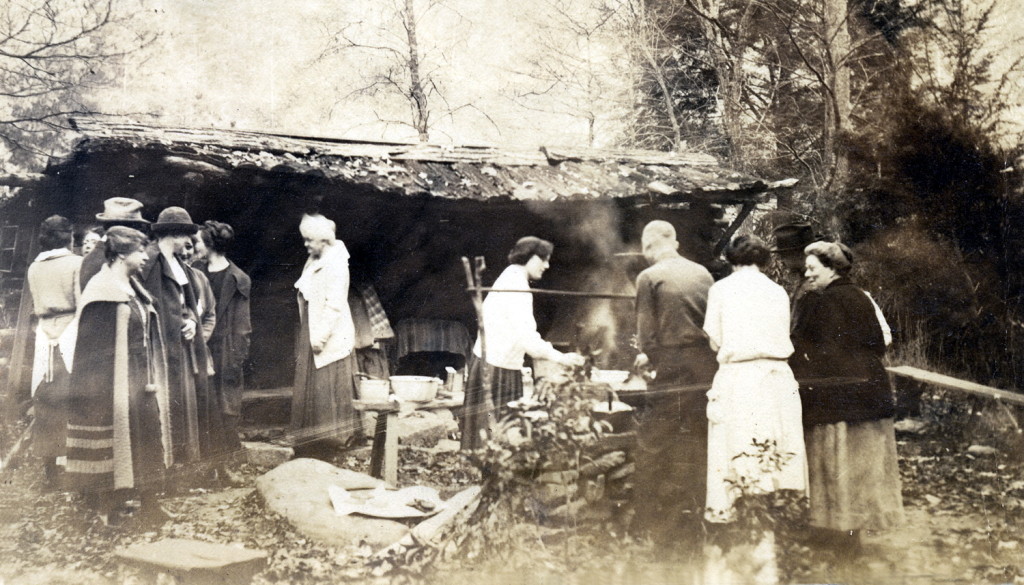
Picnic at the Lean-To with members of the PMSS Board of Trustees of the School. [X_100_workers_2553a_mod.jpg]
Angela Melville: GALLERY
- Miss Angela Melville [?] [X_100_workers_2541.jpg]
- Angela Melville on horseback with riderless horse behind her. [X_099_workers_2492a_mod.jpg]
- Tea on the lawn at Zande House [Dogwood Breakfast ?] , 1930. (l. to r.) Sally Loomis, a visitor Miss Taylor, Dr. Alfreda Withington, Miss Burbrick, Mrs. Burns, Miss Melville, Mrs. Barti…, Miss McDavid, Mrs. Bo… [X_100_workers_2541.jpg]
- “Angela Melville” Album II, Part I. “A. Melville” [melv_II_album_028.jpg]
- Angela Melville Album II – Part V. “M. Lincoln, A. Melville.” [melv_II_album_204.jpg]
- Angela Melville Album II – Part VII. “A. Melville on Logging Train.” [melv_II_album_315.jpg]
- Angela Melville Album II – Part VI. “A. Melville, E. de Long.” [melv_II_album_276.jpg]
- Angela Melville Album II – Part VI. “A. Melville with Far House little girls. 1916.” [melv_II_album_289.jpg]
- Angela Melville Album II – Part VI. “A.M. – E.K.W.” [melv_II_album_288.jpg]
- Angela Melville Album II – Part V. “1918. E.K.W. [Evelyn K. Wells] & A.M. [Angela Melville] “[melv_II_album_214.jpg]
- Angela Melville Album II – Part VI. “A.M.” [Angela Melville} [melv_II_album_280.jpg]
- Angela Melville Album II melv_II_album_200
See Also:
ANGELA MELVILLE Correspondence 1920-1928 I
ANGELA MELVILLE Correspondence 1925-1929 II
ANGELA MELVILLE Correspondence 1930-1933 III
ANGELA MELVILLE ALBUM II – Part I
ANGELA MELVILLE ALBUM II – Part II
ANGELA MELVILLE ALBUM II – Part III
ANGELA MELVILLE ALBUM II – Part IV
ANGELA MELVILLE ALBUM II – Part V
ANGELA MELVILLE Educational Plan 1929
WOODBOO 1957 Booklet by Angela Melville
ANGELA MELVILLE Song Transcriptions Creative Writing, Poetry – [In progress]
| Title | Angela Melville |
| Alt. Title | Mary Angela Melville |
| Identifier | https://pinemountainsettlement.net/?page_id=14842 |
| Creator | Pine Mountain Settlement School, Pine Mountain, KY |
| Alt. Creator | Ann Angel Eberhardt ; Helen Hayes Wykle ; |
| Subject Keyword | Angela Melville ; Mary Angela Melville ; Pine Mountain Settlement School ; directors ; associate directors ; Cooperative Bureau for Women Teachers ; National Credit Union Extension Bureau ; CUNAverse ; credit unions ; Brasstown Savings & Loan Association ; miners ; postal workers ; railroad workers ; Line Fork Settlement ; fundraising ; Darwin D. Martin ; PMSS Board of Trustees ; Southern Mountain Workers ; Pine Mountain, KY ; New York ; Brasstown, NC ; Knoxville, TN ; Zande House ; Dogwood Breakfast(?) ; Sally Loomis ; Miss Taylor ; Dr. Alfreda Withington ; Miss Burbrick ; Mrs. Burns ; Miss McDavid ; Trelawney, Jamaica ; poems ; poetry ; balladry ; Lean-To ; |
| Subject LCSH | Melville, Mary Angela, — 1886 – 1977. Pine Mountain Settlement School (Pine Mountain, Ky.) — History. Rural schools — Kentucky — History. Harlan County (Ky.) — History. Rural schools — Appalachian Region, Southern. Schools — Appalachian Region. Credit unions. |
| Date | 2009-09-13 |
| Publisher | Pine Mountain Settlement School, Pine Mountain, KY |
| Contributor | n/a |
| Type | Text ; image ; |
| Format | Original and copies of documents and correspondence in file folders in filing cabinet |
| Source | Series 7: Director’s Files ; Series 9: Staff/Personnel ; |
| Language | English |
| Relation | Is related to: Pine Mountain Settlement School Collections, Series 7: Director’s Files, and Series 9: Staff/Personnel |
| Coverage Temporal | 1916 – 1920 ; 1928 – 1930 ; |
| Coverage Spatial | Pine Mountain, KY ; New York ; Brasstown, NC ; Knoxville, TN ; Trelawney, Jamaica ; |
| Rights | Any display, publication, or public use must credit the Pine Mountain Settlement School, Pine Mountain, KY. Copyright retained by the creators of certain items in the collection, or their descendants, as stipulated by United States copyright law. |
| Donor | n/a |
| Description | Core documents, correspondence, writings, and administrative papers created by or addressed to Mary Angela Melville; clippings, photographs, publications by or about Mary Angela Melville. |
| Acquisition | n/d |
| Citation | “[Identification of Item],” [Collection Name] [Series Number, if applicable]. Pine Mountain Settlement School Institutional Papers. Pine Mountain Settlement School, Pine Mountain, KY. |
| Processed by | Helen Hayes Wykle ; Ann Angel Eberhardt ; |
| Last updated | 2007-07-12 hhw ; 2009-09-13 aae ; 2013-09-29 hhw ; 2014-03-09 aae ; 2014-04-09 hhw ; 2015-05-04 aae ; 2021-05-00 hhw; 2025-11-26 hhw |
| Bibliography |
Butler, Marguerite. “The Brasstown Savings and Loan Association.” Mountain Life & Work. 2 (July 1926): 42. Print. Melville, Angela. Business Reports Credit Union. Knoxville, TN: Thirteenth Annual Conference of Southern Mountain Workers, March 17-19, 1925.” Print. Mountain Life & Work. 1 (April 1925): 29. Print. Notes from the Pine Mountain Settlement School. I (March 1920): 2, I (November 1920): 2, and II (May 1924: 3, Spring 1978: 4): 3. Series 17: PMSS Publications. Pine Mountain Settlement School Institutional Papers. Pine Mountain Settlement School, Pine Mountain, KY. Internet resource. Roman, Shawn San. “Women in the Early Credit Union Movement,” CUNAverse, http://cunaverse.com/category/history_philosophy/ (accessed 2014-03-09). Internet resource. Melville, Mary Angela & Julia Marshall Rockwell. “The Story of Julia Rockwell.” Junction City Weekly Union, Junction City, KS. (February 16, 1961). http://www.ebooksread.com/authors-eng/kansas-state-historical-society/the-kansas-historical-quarterly-volume-27-hci/page-53-the-kansas-historical-quarterly-volume-27-hci.shtml (accessed 2014-03-09). Internet resource. [See Mary Rockwell Hook] “New York, New York Passenger and Crew Lists, 1909, 1925-1957,” index and images. FamilySearch. https://familysearch.org/pal:/MM9.3.1/TH-1951-22116-4025-6?cc=1923888&wc=M94K-GJ8:n560214294 (accessed 2013-03-09). 6591 – vol 14174-14175, Nov 5, 1942 > image 428 of 844. Internet resource. Some Hints as to Usual Credit Union Practice for Newly Organized Credit Unions Relating Chiefly to Savings, Loans, Interest Rates and Earnings. Madison, Wis: State Banking Dept, 1938. Print. |
Return to BIOGRAPHY – A-Z

